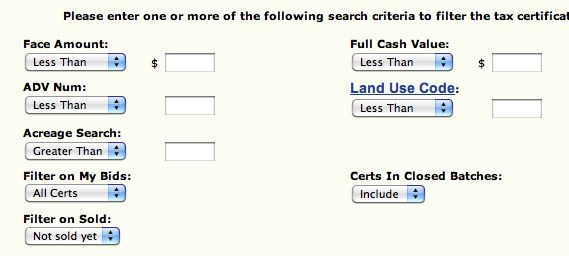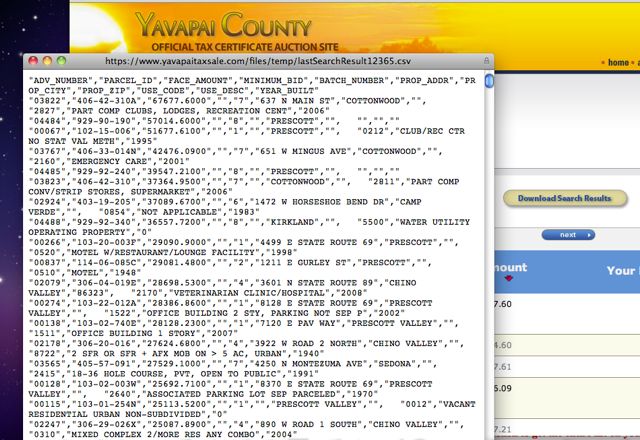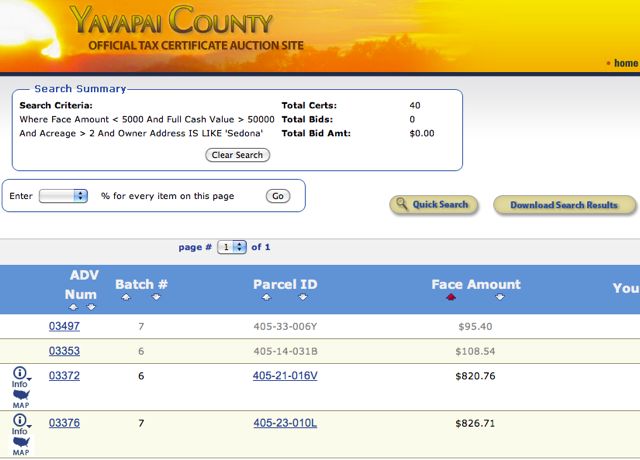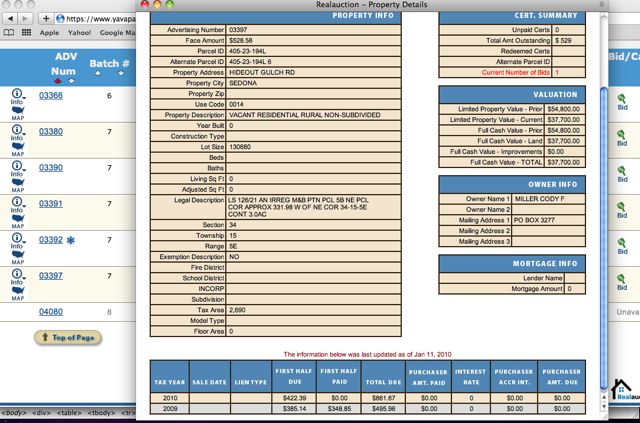
Dear Premium Members:
This month I want to profile the popular
tax sale investing state of Arizona. Tax lien certificate sales are
occurring right now, online, in four counties, and the remaining
counties will hold their tax sales in February.
Maricopa County, Arizona
January 17 – February 7, 2011
http://treasurer.maricopa.gov/research/faq_lien.htm
Auction website:
https://www.bidmaricopa.com
Yavapai County, Arizona
January 18 – February 8, 2011
http://www.co.yavapai.az.us/BackTaxSale.aspx
Auction website:
https://www.yavapaitaxsale.com
Apache County, Arizona
January 28 – February 17, 2011
https://www.bidapachecounty.com
Coconino County, Arizona
January 28 – February 17, 2011
http://www.coconino.az.gov/treasurer.aspx?id=548
Auction website:
https://www.coconinotaxsale.com
Visit
http://www.rogueinvestor.com/Tax_Sale_Calendar.pdf
for our recently revised tax sale calendar (password = taxsales).
In
Arizona, the state-mandated interest rate on certificates is 16
percent, so this is where the bidding begins (the winning bidder pays
the minimum bid and accepts the lowest interest rate). There is a
three-year redemption period; but the property owner also is allowed to
redeem any time after this period but before a Treasurer's deed is
delivered to the certificate holder who forecloses on the property.
The
following is a discussion of the tax lien sale process in Arizona.
It will be followed by a screen of the Yavapai County tax sale list.
ARIZONA TAX LIEN SALES
General
Information
Governing State
Law:
Arizona Revised Statutes, Title 42 – Taxation, Chapter 18 – Collection
and Enforcement, Article 3 – Sale of Tax Lien for Delinquent Taxes, and
Article 4 – Redemption of Tax Liens and Article 5 – Judicial
Foreclosure of Right of Redemption, and Article 6 – Administrative
Foreclosure of Right of Redemption
State Statute:
http://www.azleg.gov/ArizonaRevisedStatutes.asp?Title=42
County Agency
Conducting the Sales: County Treasurer
Private
Administrators of Sales: Yes: Realauction (
http://www.realauction.com) and
Grant Street Group (
http://www.grantstreet.com/revenue_collection/lienauction)
Sale Date:
The tax lien sale must be held in February. The sale continues from day
to day, Sundays and holidays excluded, until the tax lien on each
parcel has been sold. (ARS 42-18112[A] and [B]. Some online sales begin
in January and end in February.
Public or Internet:
Both.
Interest Rate:
16 percent (ARS 42-18114 and 42-18053). The lien bears interest at the
bid rate from the first day of the month following the purchase of the
tax lien (ARS 42-181140).
Redemption Period:
The lien may be redeemed at any time within three years after the date
of the sale; or after three years but before the delivery of a
treasurer's deed to the purchaser or the purchaser's heirs or assigns.
(ARS 42-18152)
Before
the Sale
Obtaining the Tax
Sale List:
The list is posted near the outer door of the office of the County
Treasurer for at least two weeks before the date of the sale. The list
is also published at least one time in a newspaper of general
circulation in the county. The publication must be at least two weeks
but not more than three weeks before the date of sale. The newspaper
that prints the list must also post the list from the first publication
date through March 1 of the current year on the internet on a web site
that posts the legal notices of ten or more Arizona newspapers. (ARS
42-18109[A] – [C]) For most counties, the list is also published on the
County Treasurer’s website.
Registration:
Most counties require a good faith deposit equal to a percentage of the
total dollar amount of liens the bidder anticipates winning.
For
example: If a bidder anticipates winning $100,000 in tax lien
certificates and if that county requires a 10% deposit, he/she must
deposit $10,000 with the Treasurer.
Special Note:
Realauction hosts live training classes via the Internet every Friday
while the Arizona auctions are live. Site Guided Tours are available at
their practice site at www.arizonataxsale.com. A new practice auction
runs every day. Visit
https://www.arizonataxsale.com/training
for more information.
At
the Sale
Minimum Bid:
The minimum bid is the total amount of all unpaid taxes that are
delinquent on the property, together with all penalties, interest and
charges due for the current or preceding years (ARS 42-18104 and
42-18107).
Bidding Process:
The winning bidder is the person who pays the whole amount of
delinquent taxes, interest, penalties and charges due on the property,
and who in addition offers to accept the lowest rate of interest on the
amount paid to redeem the property from the sale (ARS 42-18114).
Payment:
The purchaser of a tax lien is required to pay the purchase price in
cash at the time of sale (ARS 42-18116[A]). Payment methods vary for
each county. Generally, deposits and payments may be made via ACH
(electronic check), wire transfer, cash, cashier’s check, or money
order. The purchaser also must pay a processing fee of not more than
$10 per tax lien (ARS 42-116[C]). If the purchaser fails to pay and the
Treasurer cannot resale the lien or the sale is closed, the Treasurer
can either advertise the lien specially, or recover the amount bid by
civil action in a court of competent jurisdiction (ARS 42-18116[B]).
If
because of an erroneous sale a real property tax lien is sold on
property on which no tax is due, the County Treasurer must hold the
purchaser harmless by paying the purchaser the amount of the principal
and interest at the rate bid and endorsed on the certificate of
purchase or 10 percent per year simple, whichever is less (ARS
42-118125).
Evidence of
Successful Bid:
The County Treasurer will deliver a certificate of purchase to the
purchaser at the sale for delinquent taxes. Alternatively, the
Treasurer may provide for a registered certificate in the Treasurer's
records. (ARS 42-18118[A]). The purchaser must pay a fee of $10 per
certificate (ARS 42-18118[D). Most counties today do not issue paper
certificates. The certificate is kept as an electronic file at the
treasurer’s office. A description of the information contained on a
certificate is provided by ARS 42-18118(B).
Unsold Tax Lien
Certificates:
Unsold liens are assigned (“struck off”) by the County Treasurer to the
state for the amount of the taxes, interest, penalties and charges, and
a certificate of purchase is issued for each such lien.
These
certificates are available for purchase by visiting the Treasurer's
office or website once the auction is closed and balanced. These
certificates bear an interest rate of 16 percent per year simple, with
a fraction of a month counting as a whole month (ARS 42-18053[A]) and
42-18113[B][2]).
After
the Sale
Paying Subsequent
Taxes:
On or after June 1, if a person who holds a certificate of purchase
wants to pay subsequent taxes, accrued interest and related fees due on
the property (i.e., after the second half taxes have become delinquent
but before they go to auction), the person must present the certificate
or receipt of registered certificate to the County Treasurer. The
Treasurer will enter the amount of the payment on the certificate and
on the record of tax lien sales (for a fee of $5). The amount of
subsequent taxes bears interest at the rate stated in the certificate
of purchase from the first day of the month following the purchase of
the subsequent tax lien. (ARS 42-18121)
If a person who
holds a certificate of purchase does not pay the subsequent taxes,
accrued interest and related fees due on the property, the County
Treasurer may require a person who wants to purchase a subsequent
certificate of purchase on the property to acquire by assignment all
currently outstanding certificates of purchase previously issued on the
property. The County Treasurer will process the sale as an assignment
on behalf of the previous holder of the certificate of purchase. Such
an assignment vests in the person all the right and title of the
original purchaser with the lien date effective from the original lien
sale date. (ARS 42-18121.01)
Redemption Amount:
Simple interest accrues on a monthly basis. If the certificate carries
an interest rate of 12%, then interest will accrue at 1% simple
interest every month until the certificate is redeemed.
Process if the
Lien is Redeemed:
When the owner redeems the certificate, he/she will pay the delinquent
taxes, interest, and assorted fees and costs, and a check is sent out
by the County Treasurer with a letter to the certificate holder. (ARS
42-18153[A]) The certificate holder must surrender the certificate of
purchase.
If only a portion of the tax lien on the property
described in the certificate of purchase or the registered certificate
is redeemed, the Treasurer will endorse on the certificate or annotate
the record of the registered certificate the portion redeemed and the
amount of money paid to the person holding the certificate and shall
take a receipt for the money paid. (ARS 42-18155)
Assignment of Tax
Lien Certificate:
The certificate of purchase, whether registered or paper, is assignable
by endorsement. An assignment, when noted on the record of tax lien
sales in County Treasurer’s office, vests in the assignee all the right
and title of the original purchaser. (ARS 42-18118[C])
For
any tax lien assigned to the State, the County Treasurer shall sell,
assign and deliver the certificate of purchase to any person who pays
to the County Treasurer the whole amount due under the certificate,
including interest, penalties and charges, and in addition the entire
amount of subsequent taxes assessed on the property described in the
certificate. The County Treasurer shall collect a fee of not more than
$10 from the assignee for making each assignment. (ARS 42-18-122)
Life Span of Tax
Lien Certificate:
Ten years. If the tax lien is not redeemed and the purchaser or the
purchaser's heirs or assigns fail to commence an action to foreclose
the right of redemption as provided by this chapter within 10 years
after the last day of the month in which the lien was acquired pursuant
to section ARS 42-18114, the certificate of purchase or registered
certificate expires and the lien is void. (ARS 42-18127[A])
At
least thirty but not more than sixty days before the expiration date,
the County Treasurer must notify the purchaser by certified mail of the
pending expiration. Within seven days after expiration, the Treasurer
wil notify the purchaser by certified mail that the lien and
certificate of purchase or registered certificate have expired. (ARS
42-18127[B])
This section does not apply if, at the time of expiration:
- The parcel for which the lien was purchased is
subject to a judicial proceeding or a 30-day notice pursuant to ARS
42-18202.
- Other
applicable law or court order prohibits the commencement of an action
to foreclose the right to redeem. The expiration date of the tax lien
shall be extended to 12 months following the termination of such
prohibition. (ARS 42-18127[D])
I will send you a special
report next week that discusses the method for foreclosing on the
property if the owner does not redeem within the 3-year period.
County
Tax Lien Sales Information
2011 Arizona Tax Lien Sale Links for the Largest Counties
(1) Apache County
http://www.bidapachecounty.com
(Grant Street Group online sale)
http://www.co.apache.az.us/Departments/Treasurer/Treasurer.htm:
see header “Informational Links”
(2) Cochise County
http://cochise.az.gov/cochise_treasurer.aspx?id=52
(3) Coconino County
http://www.coconinotaxsale.com
(Realauction online sale)
http://coconino.az.gov/treasurer.aspx?id=548:
mouse over “Tax Liens”
(4) Maricopa County
https://www.bidmaricopa.com
(Grant Street Group online sale)
http://treasurer.maricopa.gov:
see header “Liens & Research”
(5) Mohave County
http://www.mohavetaxsale.com
(Realauction online sale)
http://www.co.mohave.az.us/ContentPage.aspx?id=132&cid=223
(6) Pima County
http://www.to.pima.gov/tax_lien_sale.html
(public auction)
(7) Pinal County
http://pinalcountyaz.gov/Departments/Treasurer/Pages/TaxLienSale.aspx
(online sale via the Treasurer’s website)
(8) Yavapai County
http://www.yavapaitaxsale.com
(Realauction online sale)
http://www.co.yavapai.az.us/BackTaxSale.aspx
(9) Yuma County
http://www.co.yuma.az.us/index.aspx?page=86
(public auction)
YAVAPAI COUNTY, ARIZONA
EXAMPLE
The
Yavapai County tax lien certificate sale is conducted, for the County
Treasurer, by Realauction.com. This is a privately owned company
specializing in the advertising and sale of delinquent tax certificates
for local governments and municipalities.
Step 1: Background
Information
There
is a great deal of information available online that you should read
before you register for the tax lien sale. First, visit the County
Treasurer's website at http://www.co.yavapai.az.us/Treasurer.aspx.
There is a link "Treasurer's Back Tax Sale" in the left column (http://www.co.yavapai.az.us/BackTaxSale.aspx),
and a link "2011 Tax Lien Sale" or "Online Internet Auction" in the
main body (http://www.yavapaitaxsale.com).
Click on the link for Treasurer's Back Tax Sale and
you'll land on a page with links to all of the following:
- tax liens explained
- 29 frequently asked questions
- assessor book locations map
- 2011 tax sale list in pdf format (139 pages)
- available
tax liens for purchase from previous sales (116 pages - these liens are
available for purchase directly from the county and bear the full 16%
interest rate)
- document with more information
I would even recommend contacting the Treasurer's office to see if you
can find out any information regarding last year's sale.
Click on the link for 2011 Tax Lien Sale and you will be taken to the
official auction website at
http://www.yavapaitaxsale.com.
On that site, be sure to read through the information available by
clicking on the following links:
- Start Here: a discussion of how the sale works
- Bidding Rules
- Preview Items for Sale: the tax sale list
Once you are comfortable that you understand the process, proceed with
registering yourself as a bidder.
Step 2: Register
You only need to register for the sale at the official auction website (
http://www.yavapaitaxsale.com).
There is no additional registration that needs to occur through the
County Treasurer. Click on the link "Register" on the home page of the
official auction website. The site will walk you through the entire
process.
Step 3: Training
For
training information, click on the links "Training General Information"
and "Tax Certificate Process" on the home page of the auction website
at
https://www.yavapaitaxsale.com.
Live "webinar" training classes will be held via the Internet by
Realauction on the dates and times listed on the website at
https://www.yavapaitaxsale.com/training.
The classes last approximately 90 minutes, cover use of the software
only, and are free of charge. Attendance is by registration only. You
will need to contact the Realauction Customer Service Center at
(877) 361-7325 in advance to register.
In addition to the webinar classes, Realauction offers a fully
functional "practice" site at
http://www.arizonataxsale.com
that you can use to familiarize yourself with the online auction
process. The practice auctions are held every day and close at
2:00 PM MT.
From the home page of the practice site (
http://www.arizonataxsale.com),
additional training materials are available by clicking one of the
two "Site Guided Tours" which contain page-by-page instructions on how
to use the site.
You can also call the Realauction Customer Service Center and a
representative will assist you.
Step 4: Tax Sale List
Use the list available
on the official auction website at https://www.yavapaitaxsale.com/view_bids.cfm,
as you will be able to sort the list and it has been populated with
external data.

As you can see, for each certificate listed there is an ADV number, a
parcel ID number, a face amount, and a status.
The ADV number is
linked to a page on which the County Treasurer has compiled a lot of
important information for you already:
- Property
Information:
Advertising Number, Face Amount, Parcel ID, Alternate Parcel ID,
Property Address, Property City, Property Zip, Use Code, Property
Description, Year Built, Construction Type, Lot Size, Beds, Baths,
Living Sq Ft, Adjusted Sq Ft, Legal Description, Section, Township,
Range, Exemption Description, Fire District, School District, INCORP,
Subdivision, Tax Area, Model Type and Floor Area
- Certificate
Summary: Unpaid Certs, Total Amt Outstanding, Redeemed
Certs, Alternate Parcel ID, Current Number of Bids
- Valuation:
Limited Property Value - Prior, Limited Property Value - Current,
Full Cash Value - Prior, Full Cash Value - Land, Full Cash Value -
Improvements, Full Cash Value - TOTAL
- Owner
Information: Owner Name 1, Owner Name 2, Mailing Address
1, Mailing Address 2, Mailing Address 3
- Mortgage
Information: Lender Name, Mortgage Amount
- Outstanding
Taxes:
Tax Year, Sale Date, Lien Type, First Half Due, First Half Paid, Total
Due, Purchaser Amt. Paid, Interest Rate, Purchaser Accr. Int.,
Purchaser Amt. Due
Pay special attention to any blue icons to
the right of the ADV number column. For example, an asterisk is used to
indicate parcels that have prior tax years due or an existing lien, but
because of unpaid subsequent taxes they are going back into sale this
year. If you purchase one of these parcels with a prior lien or prior
year you are required to buy out the prior lien as well as the current
lien.
A "P" icon refers to possessory rights parcels that
are strictly improvements on the land. In the case of possessory rights
and utility company parcels, the County Treasurer asks you to be very
careful and have a complete understanding of what you are bidding on
before you bid.
As part of your due diligence, you should visit the U.S. Bankruptcy Court for the District of
Arizona at
http://www.azb.uscourts.gov. Under
the header "Online Services," click on the link "U.S. Party/Case
Index." This takes you to an electronic public access service at
https://pacer.login.uscourts.gov/cgi-bin/login.pl?court_id=00idx
that allows users to obtain case and docket information from federal
appellate, district and bankruptcy courts.
The Parcel ID number
is linked to an interactive map that gives you additional information
on the owner, parcel, improvements, assessment, taxes and recent sale
information on the RESULTS tab. Be sure to look at the MAP LAYERS and
SEARCH tabs as well.
The Face Amount is
the minimum bid for the certificate. You can sort by ascending or
descending values.
Finally,
the Status column
lets you know whether the certificate is still available for sale.
Again, you can sort by ascending or descending.
Step
5: Screen the List
Let's start by looking at the entire list. Go to the quick search
feature and do not type anything in the search and you will pull up the
entire range of possibilities - over 4900 liens ranging from a ranch
lot
with taxes owed of $35.27 to a health club with a whopping tax bill of $67,677.60.

Now, let's use the export
function to get the entire list on your computer.
Go to the download search results button. Click on the button and you
will generate a file called a .csv file. Save this file to your
computer and open it with Excel, Open Office or any spreadsheet or
datbase program. CSV files are comma-separated files designed to be
read by these programs.
You now have the entire list, which you can easily manipulate by using
the sort features of Excel.

Why bother doing this you might ask?
One reason is that I like to look at the entire list in spreadsheet
format and see what it has to offer without clicking on each link.
Now, having said that, let's go back to the Real Auction system and try
another search that is often overlooked. Go back to the quick search
feature and go down to City. Using only city, you can refer back to
your spreadsheet list and decide on a city, such as Sedona, Prescott or
Chino Valley. This is a location screen.
For example, try Sedona.
Using the location screen, you can now screen by the face value of the
lien and the value of the property.
Try a face value less than $5000 and a property value of greater than
$50000.
Once you have completed the screen, you should have something a little
more manageable, but my list is still 200 liens.
So, it's time to look at the property type. This is personal choice,
but I like land and in Sedona that's a valuable commodity. Let's try
a search of acreage greater than 1.0 acre. That should screen out most
small lots and leave larger pieces of land.
You may choose residential properties, duplexes, commercial, etc. Use
the drop down land use codes and if you only want to search one
property type, search, for example, between 11 and 11 and you will only pull up that type.
This leaves my list at 40; however, about half of these are
unavailable, meaning they have been redeemed and pulled from the list.
It looks like my final list is about 17, which is something I can
handle.

Okay, here is a parcel, I might be interested in. It is in Sedona, but
land only. It currently has only one bid. It is a recent tax lien with
no outstanding liens and it is larger than 2 acres in size. The full
cash value is approximately $40000 and the taxes owed is about $770.
Chances are the winning interest rate will be above 10%, maybe even 14
to 16%. If it is not redeemed, I can buy next years's taxes for
about $770 and the following year's taxes for the same amount. In the
end, assuming it is never redeemed and I have to pay 3 years of taxes,
plus legal and/or title fees to foreclose and clear the title, I am
into the property for about $4000 to $5000. To be conservative, double
that and assume I have to hold it for three more years. My total
investment is $8000 to $10000 and I can sell it for $40,000 assuming no
additional appreciation, which would just about cover realtor fees
anyway.
The question is, "Would you give me $10,000 if I gave you $40,000?"
That is the tax lien game in a nutshell.
The downside is earning the interest rate at 10% to 16%.

When you are ready to place a bid, place your minimum bid amount, which
is the minimum percentage you are willing to bid. For example, you
could place a bid of 7% and if you are the lowest and the other bids
are 16%, 14% and 12%, you would win the bid at 11% even though you bid
7%. This is called proxy bidding.
Wishing you the best,
Michael